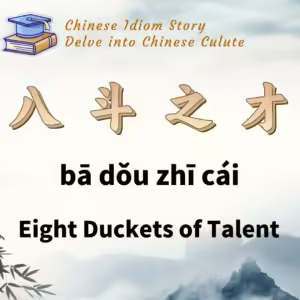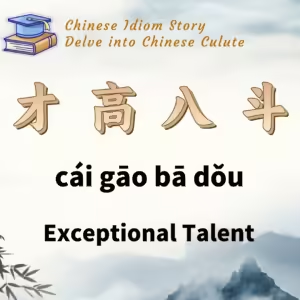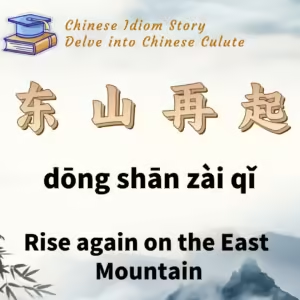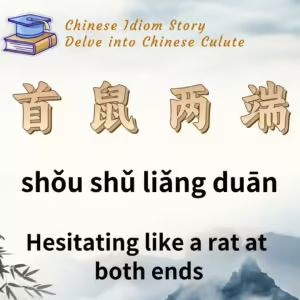
Chinese Idiom: 八斗之才 (Ba Dou Zhi Cai)
English Translation: Eight Duckets of Talent
pīn yīn: bā dǒu zhī cái
Idiom Meaning: This idiom is used to describe someone with outstanding talent and exceptional ability. It is also written as “才高八斗.”
Historical Source: The Book of the Southern Dynasties: Biography of Xie Lingyun (南史·谢灵运传); also mentioned in Tang poet Li Shangyin’s poem “Regrettable”.
Idiom Story: Cao Zhi (曹植), a talented poet of the late Eastern Han Dynasty, faced severe setbacks and persecution during the reign of his brother Cao Pi (曹丕) and continued to suffer even after Cao Pi’s death when Cao Rui (曹睿) ascended the throne. Despite his repeated petitions for opportunities to contribute to the state, he remained in political obscurity and continued to be persecuted. In 232 AD, Cao Zhi died in hardship at the age of 41.
Although Cao Zhi’s life was short, he achieved significant accomplishments in poetry. He was highly regarded as the most outstanding representative of the “Jian’an Literature” of the late Han Dynasty, known for his broad content, positive themes, and a grand and uplifting style. His works include innovations in four-character, five-character, six-character, and mixed-character poetry. Particularly in five-character poetry, he excelled in using metaphorical techniques, and his refined and splendid language established a new style in this genre. Cao Zhi left behind over two hundred pieces of poetry and prose during his forty-one years of life. His works such as “Ode to the Luo River Goddess” and “To the White Horse King Biao” have been celebrated through the ages.
Cao Zhi’s diligent study and natural talent in poetry were remarkable, often surprising even his father, Cao Cao (曹操). Once, after reading Cao Zhi’s work, Cao Cao doubted it was his son’s work and questioned Cao Zhi about it. Cao Zhi replied, “What I speak becomes discussion, what I write becomes text.” This meant that his words were naturally transformed into written works.
Cao Zhi’s fame extended beyond his time and influenced later generations of writers. During the Southern Dynasty of Song, the poet Xie Lingyun (谢灵运), who was also known for his poetry and self-confidence, praised Cao Zhi’s poetry and remarked, “Among the talents in the world, there are only ten ducats. Cao Zhi alone possesses eight, while I have one. From ancient times to the present, there is only one ducat remaining.”
In the Liang Dynasty of the Southern Dynasties, the poetry critic Zhong Rong (钟嵘) in his “Comments on Poetry” compared Cao Zhi’s position among poets to the importance of Zhou rites in human relations, dragon and phoenix in feathers, and qin and sheng in music.
Later, Tang Dynasty poet Li Shangyin (李商隐) also mentioned Cao Zhi in his poetry with the line, “Lady Mi grieves in the Zhi Tian Pavilion, using up Chen Wang’s eight ducats of talent.” Chen Wang refers to Cao Zhi, who was given the title of King of Chen and posthumously honored as King of Thought.
From these records and poetic references, the idiom “eight ducats of talent” emerged to describe someone of extraordinary talent.






